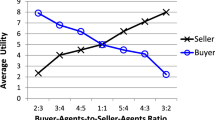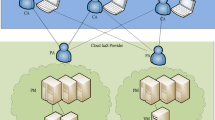Abstract
Fog computing has emerged as a decentralized computing paradigm that extends cloud services to the network edge, enabling faster data processing and real-time applications. The increasing popularity of fog computing has led to the emergence of a potential market involving users and providers of fog resources. However, both parties are driven by self-interest and seek to maximize their utility, giving rise to multiple conflicts extending beyond mere price considerations. Negotiations can play a crucial role in resolving conflicts and establishing mutually beneficial service level agreements. Moreover, in the heterogeneous fog environment, quality of service attributes, such as throughput, delay, trust, power dissipation, etc., vary significantly among different user-fog associations. These attributes, although non-negotiable, hold great importance for entities and directly influence partner selection. Entities may exhibit a preference for one another based on these non-negotiable attributes. To the best of our knowledge, no existing literature specifically addresses the issue of associating with a preferred trading partner at a negotiated value for multiple issues in the fog environment. This research aims to address this gap and provide insights into this unexplored area. This work presents a novel Preference-based Muti-Issue Negotiation Algorithm, PMINA, for many to many, bilateral and concurrent negotiations in the fog environment. The results confirm the significance of PMINA, demonstrating a substantial enhancement in user and fog utilities.













Similar content being viewed by others
Availability of data and materials
The authors confirm that the data supporting the findings of this study are available within the article.
References
Bonomi F, Milito R, Zhu J, Addepalli S (2012) Fog computing and its role in the internet of things. In: Proceedings of the first edition of the MCC workshop on mobile cloud computing, pp 13–16
Aazam M, St-Hilaire M, Lung C-H, Lambadaris I, Huh E-N (2018) In: Rahmani AM, Liljeberg P, Preden J-S, Jantsch A (eds) IoT resource estimation challenges and modeling in fog. Springer, Cham, pp 17–31
Abedin SF, Alam MGR, Kazmi SA, Tran NH, Niyato D, Hong CS (2018) Resource allocation for ultra-reliable and enhanced mobile broadband iot applications in fog network. IEEE Trans Commun 67(1):489–502
Zhang H, Xiao Y, Bu S, Niyato D, Yu FR, Han Z (2017) Computing resource allocation in three-tier IoT Fog networks: a joint optimization approach combining Stackelberg game and matching. IEEE Internet Things J 4(5):1204–1215
Jia B, Hu H, Zeng Y, Xu T, Yang Y (2018) Double-matching resource allocation strategy in fog computing networks based on cost efficiency. J Commun Netw 20(3):237–246
Su C, Ye F, Zha Y, Liu T, Zhang Y, Han Z (2021) Matching with contracts-based resource trading and price negotiation in multi-access edge computing. IEEE Wirel Commun Lett 10(4):892–896
Sim KM (2019) A computationally efficient bargaining mechanism for fog commerce. IEEE Lett Comput Soc 2(1):5–8
Malukani SP, Bhensdadia CK (2022) PREFNEG: preference-based price negotiation scheme in fog environment. Int J Grid Util Comput 13(5):565–576
Sim KM (2023) An incentive-compatible and computationally efficient fog bargaining mechanism. Comput Econ 1–36
Sun Z, Sun G, Liu Y, Wang J, Cao D (2023) Bargain-match: a game theoretical approach for resource allocation and task offloading in vehicular edge computing networks. IEEE Trans Mob Comput
Tom RJ, Sankaranarayanan S, Rodrigues JJ (2020) Agent negotiation in an IoT-Fog based power distribution system for demand reduction. Sustain Energy Technol Assess 38:100653
Deochake S, Mukhopadhyay D (2021) An agent-based cloud service negotiation in hybrid cloud computing. In: Tuba M, Akashe S, Joshi A (eds) ICT systems and sustainability. Springer, Singapore, pp 563–572
Yaqub E, Yahyapour R, Wieder P, Kotsokalis C, Lu K, Jehangiri AI (2014) Optimal negotiation of service level agreements for cloud-based services through autonomous agents. In: 2014 IEEE international conference on services computing. IEEE, pp 59–66
Kumar R, Hassan MF, Adnan MHM, Shukla S, Safdar S, Qureshi MA, Abdel-Aty A-H (2023) A user-priorities-based strategy for three-phase intelligent recommendation and negotiating agents for cloud services. IEEE Access 11:26932–26944
Zheng X, Martin P, Brohman K (2012) Cloud service negotiation: concession vs. tradeoff approaches. In: 2012 12th IEEE/ACM international symposium on cluster, cloud and grid computing (CCGRID 2012). IEEE, pp 515–522
Zheng X, Martin P, Brohman K, Da Xu L (2014) Cloud service negotiation in internet of things environment: a mixed approach. IEEE Trans Ind Inf 10(2):1506–1515
Son S, Sim KM (2011) A price-and-time-slot-negotiation mechanism for cloud service reservations. IEEE Trans Syst Man Cybern B (Cybern) 42(3):713–728
Son S, Sim KM (2015) Adaptive and similarity-based tradeoff algorithms in a price-timeslot-QoS negotiation system to establish cloud SLAs. Inf Syst Front 17(3):565–589
Shojaiemehr B, Rahmani AM, Qader NN (2019) A three-phase process for SLA negotiation of composite cloud services. Comput Stand Interfaces 64:85–95
Rubinstein A (1982) Perfect equilibrium in a bargaining model. Econometr J Econ Soc 97–109
Shannon CE (1948) A mathematical theory of communication. Bell Syst Tech J 27(3):379–423
Friis HT (1946) A note on a simple transmission formula. Proc IRE 34(5):254–256
Al-Khafajiy M, Baker T, Asim M, Guo Z, Ranjan R, Longo A, Puthal D, Taylor M (2020) COMITMENT: a fog computing trust management approach. J Parallel Distrib Comput 137:1–16
Ren F, Zhang M, Fulcher J (2012) Bilateral single-issue negotiation model considering nonlinear utility and time constraint. New Trends in Agent-Based Complex Automated Negotiations, 21–37
Faratin P, Sierra C, Jennings NR (1998) Negotiation decision functions for autonomous agents. Robot Auton Syst 24(3–4):159–182
Deochake S, Mukhopadhyay D (2021) An agent-based cloud service negotiation in hybrid cloud computing. In: ICT systems and sustainability: proceedings of ICT4SD 2020. Springer, vol 1, pp 563–572
Khan K, El-Sayed I, Arboleya P (2022) Multi-issue negotiation EVS charging mechanism in highly congested distribution networks. IEEE Trans Veh Technol 71(6):5743–5754
Saaty TL (1977) A scaling method for priorities in hierarchical structures. J Math Psychol 15(3):234–281
Funding
This research received no specific grant from any funding agency.
Author information
Authors and Affiliations
Contributions
SM conducted a literature review, designed and implemented the algorithm, and performed simulations. CKB supervised the process and contributed to manuscript review.
Corresponding author
Ethics declarations
Conflict of interest
The authors declare that they have no competing interests.
Ethical approval
Not applicable.
Additional information
Publisher's Note
Springer Nature remains neutral with regard to jurisdictional claims in published maps and institutional affiliations.
Rights and permissions
Springer Nature or its licensor (e.g. a society or other partner) holds exclusive rights to this article under a publishing agreement with the author(s) or other rightsholder(s); author self-archiving of the accepted manuscript version of this article is solely governed by the terms of such publishing agreement and applicable law.
About this article
Cite this article
Malukani, S., Bhensdadia, C.K. Preference based multi-issue negotiation algorithm (PMINA) for fog resource allocation. Computing (2024). https://doi.org/10.1007/s00607-024-01271-4
Received:
Accepted:
Published:
DOI: https://doi.org/10.1007/s00607-024-01271-4




